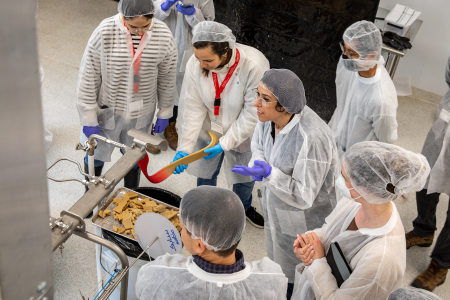NCFIL Extrusion Short Course: Attendees Want More

The North Carolina Food Innovation Lab’s (NCFIL) Twin Screw Extrusion short course left attendees asking for more. From March 28-31, 16 participants engaged with classroom learning, demonstrations, and hands-on practical experience with NCFIL’s relatively exclusive and highly in-demand 30 mm – 36 L/D Bühler BCTM PiloTwin extruder.
Course Overview
Twin Screw Extrusion has become the preferred process for extrusion of texturized protein and high-moisture meat alternatives, yet it takes a lot of trial and error to truly master this unique processing equipment. This four-day course focused on topics ranging from principles of extrusion and screw configuration to operating conditions and downstream processing. It also included plenty of time to change and view the output of various parameters.
Lee Cooper, course attendee and Founder and CEO of Barvecue, Inc., says, “The course offered a nice balance of in-depth classroom instruction and hands-on pilot plant experience. A highlight was the opportunity to learn from the world-class instructor team led by industry veterans with years of scientific, engineering, and practical knowledge.”
Joseph Hildebrand, Pilot Plant Manager at NCFIL, and Billy Vance, Customer Service Manager at Bühler, led participants through the hands-on activities. The classroom lectures were taught by NCFIL’s Executive Director Bill Aimutis and Bühler’s Dave Reynolds, Sales & Business Development Manager, and Eugene Dust, Senior Extrusion Applications Engineer.
Dust says, “It was an excellent experience working with the NCFIL team and the inquisitive attendees. The workshop met and, in many ways, exceeded all expectations of all of us. It was great fun.”
Wide Appeal
Recommended for anyone involved in development, production, or procurement of texturized and high moisture meat alternatives, the course drew a wide audience. Professionals from the food manufacturing and food ingredient technology industries were eager to work with NCFIL’s smaller-sized extruder, including representatives from Barvecue, creator of plant-based BBQ products; Lypid, manufacturer of vegan fat; Air Protein, a company that makes meat from air; and Impossible Foods, producer of plant-based meat, dairy and fish.
Participants possessing a variety of skill levels with extrusion found the experience beneficial. In fact, Hildebrand confirms that three companies who attended the course have already reached out to start planning projects with NCFIL.
Numerous Benefits
A post-course survey revealed that attendees really appreciated the expansive knowledge of all the trainers, their perspectives on the subject matter, their willingness to answer questions, and their ability to engage the audience.
A majority (70%) of the professionals who attended were considered novices, having little to no prior experience with extrusion. The biggest benefit, according to Hildebrand, was being able to put the extruder pieces together and see the full picture. He compares it to “seeing your kid’s face opening presents Christmas morning. The participants learn the principles and what to expect, but when they’re in there operating the extruder and seeing product come out at the end, it’s a lightbulb moment. They can take something from the practical portion of the class and apply it directly to their process.”
It is difficult to get access to this particular extruder because it is very expensive, relative to other pieces of food processing equipment. It is also very complex, so it takes a sizable investment to afford, install and operate this machine.
“There are not many places with the ability and flexibility that NCFIL has to run trials and try things out and see what happens,” says Hildebrand. Giving participants the opportunity to actually “get their hands dirty” was another major benefit to those who attended.
And, not to be overlooked, participants had a chance to take some time out for play, including an evening of bowling and dinner in downtown Kannapolis during which people were able to build networking friendships in-person, a rarity over the past few years.
Future Educational Opportunities
Hildebrand sees the course as a big success, and attendees are eager to return to campus. “In the immediate future, we are working to build up our workforce, but offering courses is imperative for extension activities with our mission from NC State,” he says. “We would like to do this again.”
Future courses could focus on specific equipment, but the NCFIL is interested in offering additional types of training as well. “With our expertise and facilities, we can do food safety training and product development courses.”